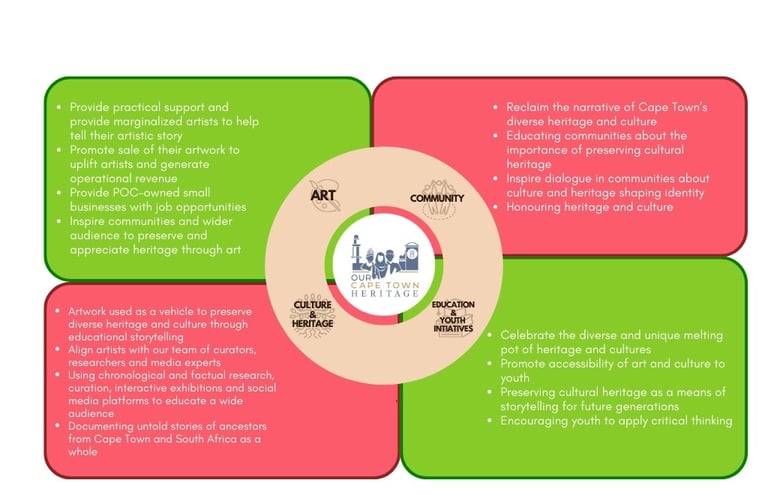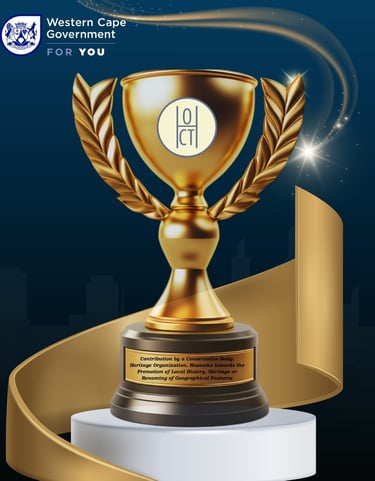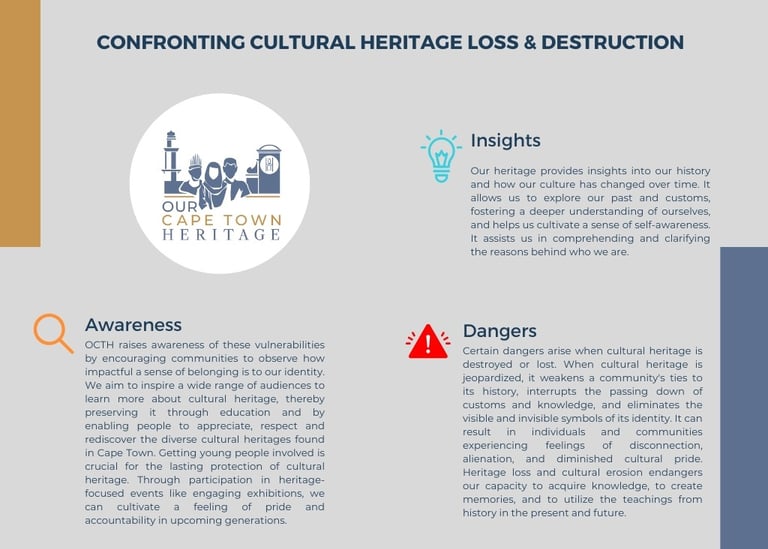PRESERVING CAPE HERITAGE AND CULTURE THROUGH EXPLORING VISUAL ARTS AND EDUCATION
About us
Our Cape Town Heritage (OCTH) is a registered non-profit organization that is committed to protecting, promoting and preserving heritage and culture by exploring visual art and history through education. OCTH reclaims the narrative of Cape Town’s diverse heritage and cultures by 'decolonizing the art world' through accessibility, awareness and storytelling.
The organization works at empowering and providing practical support to marginalized artists, showcasing cultural heritage artwork at engaging exhibitions and online. The exhibitions serve to educate, encourage and uplift communities and youth alike by inspiring ongoing dialogue and encouraging audiences to embrace and honour the rich cultures found within Cape Town.


OUR VISION
To be a beacon of hope and connection through cultural appreciation and historical awareness, where the unique heritage of our city is recognized, embraced and preserved. In our envisioned future, art plays a central role in educating, safeguarding and imparting the stories that reflect the colourful fabric of our history, weaving together the vibrant threads of our past that inform our current experiences and igniting our aspirations for the future.
Our goal is to be the pioneers in cultural heritage preservation, education and appreciation, creating initiatives through visual art that fosters meaningful connection and links. Recognizing the crucial influence of heritage in shaping identities and aiming to enhance the sense of belonging that it provides to individuals and groups alike.


DECOLONIZING THE ART WORLD
Decolonizing the art world is providing space, platforms, voices, visibility, and recognition to Indigenous peoples and all people of colour. The process of decolonizing the art world involves challenging its capacity to encompass different voices or perspectives (bearing in mind that decolonization differs and is distinct from diversity). It focuses on using art and its institutions to establish a critique of Western modernity and its colonial legacy, highlighting Cultural Heritage - as a strong resource or tool for promoting discussion, and the use of people-focused methods. We believe that decolonizing the art world stimulates both personal and shared awareness, evaluates our perspectives, and promotes a mindful transition from theoretical stances on decolonization to tangible steps towards new ways of thinking.
The art world in Cape Town has long been characterized by exclusivity and elitism, making it challenging for marginalized people of color to access opportunities. There are many obstacles encountered by marginalized artists of colour, challenges including prejudices towards traditional art styles, challenges in connecting and participating in art circles, and depending on connections for access to venues. The importance of accessibility has never been more crucial with the continued prevalence of cultural exclusion.
To decolonize the art world, OCTH employs innovative and artistic strategies and human-focused methods to challenge current narratives, raising awareness among the public about the varied interpretations and significance of heritage as perceived by various individuals, groups, and communities. Modern artists frequently act as observers, recording cultural traditions, dialects, and narratives that is in danger of vanishing. The documentation can come in various forms, and builds archives that are important resources for future generations. Art ensures cultural heritage is preserved, rejuvenated and communicated to broader audiences. We strive for a fair and dynamic cultural environment by identifying and overcoming obstacles that hinder marginalized artists of colour from engaging fully in the art world. We are committed to supporting artists of colour by amplifying their voices and promoting their cultural heritage artwork; supporting their vision of exhibiting and reclaiming
the narrative. Artists preserve heritage and culture by taking inspiration from their cultural background, they incorporate stories and symbols that connect with their communities by including it into their artwork.
We promote the acknowledgment and spread of diverse heritage stories from marginalized communities, and incorporate more collaborative approaches in managing and developing heritage. We understand that the power of art and heritage cultivates bonds and feelings of comfort and connection, especially when challenging a history of cultural imperialism. Planning exhibitions and events showcasing the work of marginalized artists of colour, decolonizes learning spaces centered around heritage, sparking open discussions on the significance of local, Indigenous, and minority cultures and challenge colonial stories. History remains alive and is shaped in the current moment and by confronting the past, it can lead to a promising and more comprehensive future.
Our commitment goes well beyond the surface-level elements of exhibition logistics; we are intricately involved in the comprehensive process of conceptualizing and developing. This entails a proactive approach to research, where we delve into diverse themes and concepts that can enhance the artistic experience. Our team works in close collaboration with artists to grasp their visions and goals, ensuring that the exhibitions we curate resonate with both the creators and the audience. This foundational work is crucial in crafting a unified narrative for educational exhibitions that not only showcase art but also invite viewers to connect with the artists and their creations on a more profound level. Alongside our emphasis on conceptual development, we actively advocate for artists through various platforms, ensuring their voices are amplified and valued. Our promotional strategies are tailored to emphasize the distinct stories and viewpoints that each artist contributes. We recognize that effective promotion is vital in bridging the divide between artists and their audiences, and we are dedicated to fostering opportunities for meaningful engagement. By nurturing a supportive atmosphere, we aim to empower artists and inspire them to present their work to a wider audience.
Our Cape Town Heritage (“OCTH”) is the brainchild of Tashneem Abrahams and was conceptualised in 2017. As a photographer, Tashneem had dedicated the past 5 years to nurturing her visual artistry of the Cape Malay Culture and its diaspora. Following a journey where cultural tradition meets the spirituality of a people descended from across the continents and planting the deepest of roots into the dorsum of Cape Town. The OCTH initiative became a reality when it was officially established in March 2022, after she officially exhibited her first photographs that aimed to highlight the Cape Malay heritage and the significant history and dangers of the loss of cultural heritage. With the help and execution of a team including Muneera Davids, the exhibition was greatly amplified and successful.
The exhibition was well received by media and audiences both; young and old, resulting in an extension. The exhibition increased foot traffic, welcomed a new range of visitors, and piqued interest in heritage and culture. The exhibition was executed by individuals who realised the struggles in reclaiming the narrative, the determination it takes to preserve historical and traditional stories and the problems faced in the cultural and artistic sphere. The individuals are the additional Directors of the organisation, Muneera Davids and Nazley Towfie. OCTH is an NPO for marginalized people of colour to have the opportunity to share their cultural heritage artistic work, while educating communities about the beauty of customs and traditions.
OCTH educates a wide audience about the importance of their past and identity. By giving artists the opportunity to share their work, we are able to revere and preserve our diverse history. The organization works towards encouraging communities; including the youth to embrace art, respect different cultures and provide inclusivity and accessibility through inspiration, motivation and more importantly, teaching. Offering greater knowledge to the audience about the past, present, and future of cultural traditions and heritage in Cape Town, South Africa. OCTH aims to empower artists of colour whose work opens a dialogue allowing preservation and protection of heritage and culture.
Why are we called OUR CAPE TOWN HERITAGE?
The intention behind our name is to unite, connect and reveal our bond as a people within our nation. Bringing together and showing the invisible links that we have with each other and the multi-cultures that emanate and grew from Cape Town, South Africa. Understanding and recognizing Cape Town's original inhabitants is crucial before the arrival of settlers. The Khoisan people, expert hunter-gatherers, had been living in the region for millennia before the arrival of Europeans. Table Mountain, Cape Town's famous symbol, was given the name "Hoerikwaggo," translating to "mountain of the sea."
Being the first major and oldest city in South Africa, Cape Town is considered the one that played a crucial role in shaping the nation into what it is today, becoming the economic and cultural hub of the Cape Colony and remains one of the most culturally diverse cities. Cape Town has some of South Africa's most important history and culture. The city shows how connected we are as a nation, with its rich history, historical landmarks and cultural treasures, has the nickname "Mother City" which was first used in the early 1900s by the Cape Argus newspaper. It was utilized to portray the city as the most ancient urban region in South Africa, along with its historical and cultural importance. A large number of our forefathers were sent to Cape Town as political prisoners, while numerous others were brought there to work as slaves.
A vibrant blend of customs and heritage
The historical background of Cape Town, as well as South Africa, is rooted in Cape Town being the initial European settlement, leading many settlers to move to various regions in South Africa post the end of slavery, in search of new opportunities to begin anew. Dubbing Cape Town the Mother City due to its natural wonders. The first city that was settled and became a major urban center, before inhabitants dispersed and grew across the larger South African area. Cape Town was founded in 1652 to serve as a stopover for ships traveling to the East (the Spice Route). The city is commonly known as the Birthplace of South Africa as it is thought to have been the origin of 'civilization'. South Africa is a multicultural nation with a melting pot of cultures, people and history.
We recognize and celebrate the cultural wealth of our nation by commemorating its rich cultural history and heritage!
History of OCTH
The Board of Directors is responsible for making key strategic decisions that shape the direction of the organization, ensuring that all decisions are made unanimously. This governing body establishes the overarching policies and frameworks within which the organization operates. In contrast, the founder and director Tashneem Abrahams is tasked with managing and making routine decisions that ensure the smooth functioning of the organization. While she has the authority to handle day-to-day matters independently, there are specific instances where collaboration with another director (Muneera Davids) or the entire board is necessary. These instances are typically guided by established policies and procedures, ensuring that the actions align with the board's strategic vision.
In situations that require significant judgment or where the implications of a decision may impact the organization’s long-term goals, she needs to consult with the board. This collaborative approach provides transparency and ensures that the board remains informed about operational challenges and opportunities. By adhering to the policies and procedures set forth by the board, she can effectively balance the need for operational efficiency with the strategic oversight provided by the board. This dynamic relationship between the board is crucial for maintaining organizational integrity and accountability, achieving shared objectives.
OCTH concentrates its impact on both physical and social landscapes within the Western Cape in the Central Business District (CBD). While the team operates largely remotely, flagship in-person exhibitions are held in the heart of Cape Town to maximize visibility and accessibility for diverse audiences and to promote marginalized artists. A major focus is placed on expanding educational youth programmes in communities such as Mitchells Plain, Eerste River, and Kayamandi (Stellenbosch).
Daily Operations
The day-to-day activities of OCTH consists of daily meetings and are driven by a dedicated, largely voluntary team of directors, partners, consultants and volunteers working across several key domains. As of 2026, its daily operations are categorized into the following core areas:
Archival Research
The research team focuses on uncovering and verifying often-overlooked historical narratives to ensure accuracy, complementing the artists work
Digital Archive Research Library (DARL): Researchers utilize and contribute to this primary internal resource to document intricate histories, such as the evolution of the Cape Town textile and garment industry.
Narrative Verification: Conducting oral history interviews and visiting physical archives to explore specific cultural traditions, such as Cape Malay weddings or the history of Cape Town Garment Workers.
Communications
Artist Support and Liaison: The team provides assistance to selected marginalized artists by promoting them which includes copywriting, graphic design, and marketing services. They also navigate the logistics of showcasing work (often in Cape Town’s CBD or communities) or via online platforms.
Educational Outreach: Working closely with schools and educators, the directors develop programmes including contests that empower learners to participate, while also managing the "Through Your Lens" and "Through Your Pen" initiatives, which encourage youth to share their stories and help preserve cultural heritage.
Internal Procedure Management (Directors)
OCTH operates as a remote, volunteer-driven organization, requiring structured daily coordination. The organisation's internal procedures involves administrative tasks necessary for running the non-profit, such as financial management, budgets, funding, fundraising, updating policy and procedures, human resources, and general operational coordination.
Remote Collaboration: The team, which includes directors, consultants, and volunteers, conducts all internal meetings online to maintain effective communication across different locations.
Sustainability & Fundraising: Staff manage commercial aspects, such as a commission-based model for artwork sales and an online store selling heritage-themed merchandise (e.g., tote bags, art prints), to fund ongoing initiatives.
Planning, Logistics and Strategizing
This area focuses on long-term growth and immediate public engagement.
Public Engagement: Ongoing management of social media platforms (Instagram, Facebook) and an interactive website ensures consistent dialogue with the community and audience.
Exhibition Conceptualization: The team proactively researches and develops unified narratives for future exhibitions, the curator and team collaborates with artists to ensure their visions align with the organization's mission to "decolonize the art world".
Workshops/Walkabouts: Workshops are a primary tool for direct community and youth empowerment, while the exhibition walkabouts are guided, interactive, and educational, it combines exhibition tours with talks by artists, academics, authors, historians, public figures etc. They are designed to provide a deeper understanding and appreciation of the Cape's diverse and often-overlooked history and diverse cultures.
Key elements of a walkabout include:
Guided Exhibition Tour: Participants receive a guided tour of an art exhibition curated by OCTH, featuring the work of marginalized artists.
Artist Insights: The exhibiting artists are present to share their unique perspectives and creative processes behind their work which helps to preserve heritage and culture.
Expert Talks: The events often feature dynamic discussions or talks by local experts, who delve into specific historical and cultural themes related to the exhibition.
Archival Research Connection: Attendees learn about the extensive archival research (via the Digital Archive Research Library, DARL) that informs the exhibition's themes.
Interactive and Educational Experience: The goal is to create an interactive experience that fosters a sense of pride in heritage and encourages dialogue across generations and various perspectives.
Key elements of a workshop include:
Interactive Learning: Art facilitators and researchers manage sessions for high school learners, focusing on artistic techniques, history, and critical thinking.
Community Integration: These sessions are often held in disadvantaged areas like Mitchells Plain or Stellenbosch, aiming to foster a sense of pride and belonging.
BOARD OF DIRECTORS
Discover
Contact Us
Our cultural heritage matters
Help us learn and grow by sharing your respectful feedback on our website, exhibitions, social media and more:
Store's Terms and Conditions


